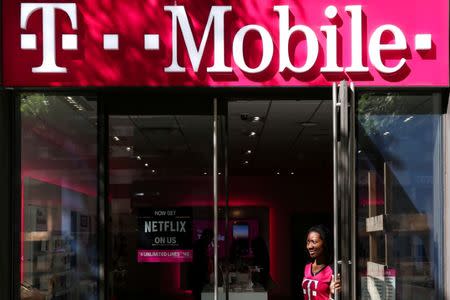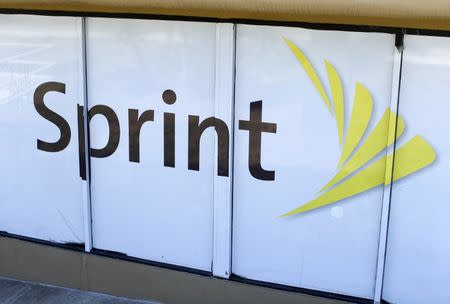Exclusive - T-Mobile, Sprint make progress in talks, aim for deal next week: sources
By Greg Roumeliotis, Liana B. Baker and Pamela Barbaglia
(Reuters) - U.S. wireless carriers T-Mobile US Inc <TMUS.O> and Sprint Corp <S.N> have made progress in negotiating merger terms and are aiming to successfully complete deal talks as early as next week, people familiar with the matter said on Thursday.
The combined company would have more than 127 million customers and could create more formidable competition for the No.1 and No.2 wireless players, Verizon Communications Inc <VZ.N> and AT&T Inc <T.N>, amid a race to expand offerings in 5G, the next generation of wireless technology.
T-Mobile majority-owner Deutsche Telekom <DTEGn.DE> and Japan's SoftBank Group Corp <9984.T>, which controls Sprint, are considering an agreement that would dictate how they exercise voting control over the combined company, two of the sources said.
This could allow Deutsche Telekom to consolidate the combined company on its books, even without owning a majority stake, the sources added. Deutsche Telekom owns more than 63 percent of T-Mobile, while SoftBank owns 84.7 percent of Sprint.
Deutsche Telekom and T-Mobile are also in the process of finalizing the debt financing package they will use to fund the deal, the sources said.
There is no certainty that a deal will be reached, the sources cautioned. The companies came close to a merger agreement in November before SoftBank's chief executive officer, Masayoshi Son, pulled out of the talks at the last minute.
The sources asked not to be identified because the negotiations are confidential. Sprint, T-Mobile, Deutsche Telekom and SoftBank did not immediately respond to requests for comment.
Sprint and T-Mobile have market capitalizations of $24 billion (£17.2 billion) and $55 billion, respectively. Sprint shares rose 9 percent in afterhours trading in New York, while T-Mobile shares were up 4 percent.
When the previous round of talks between the companies ended in November over valuation disagreements, Deutsche Telekom Chief Executive Officer Tim Hoettges left the door open by saying: "You always meet twice in life."
Failure to clinch a deal had left SoftBank's Son, a dealmaker who raised close to $100 billion for his Vision Fund to invest in technology companies, in search of other options for Sprint.
SoftBank has been looking to trim its debt, which reached 15.8 trillion yen ($147 billion) as of the end of December. It has said it is planning to raise cash by taking its Japanese mobile phone unit public this year.
Even though Sprint's customer base has expanded under CEO Marcelo Claure, growth has been driven by discounting. Analysts have said that without T-Mobile, Sprint lacks the scale needed to invest in its network and to compete in a saturated market.
T-Mobile, under its Chief Executive Officer John Legere, has fared better than Sprint, even if it remains a distant third to Verizon and AT&T. It has managed to score sustained market share gains, as innovative offerings, improving network performance and good customer service attract new customers, according to Moody's Investors Service Inc.
T-Mobile became the first major U.S. carrier to eliminate two-year contracts, a shift quickly embraced by consumers and copied by competitors. The company has also unsettled rivals with its unlimited data plans.
Another roadblock to the deal could be regulatory hurdles. Sprint's and T-Mobile's first round of merger talks ended in 2014 after U.S. President Barack Obama's administration expressed antitrust concerns about the deal.
It is not clear how the Trump administration would view the combination. AT&T agreed to acquire U.S. media company Time Warner Inc <TWX.N> in October 2016 for $85 billion. The U.S. Department of Justice has sued to block the deal over concerns about the companies' pricing power in the media market. AT&T and Time Warner are currently defending their deal in court.
(Reporting by Greg Roumeliotis and Liana B. Baker in New York and Pamela Barbaglia in London; Additional reporting by Jessica Toonkel in New York and Douglas Busvine in Frankfurt; Editing by Leslie Adler and Tom Brown)

 Yahoo Finance
Yahoo Finance 

